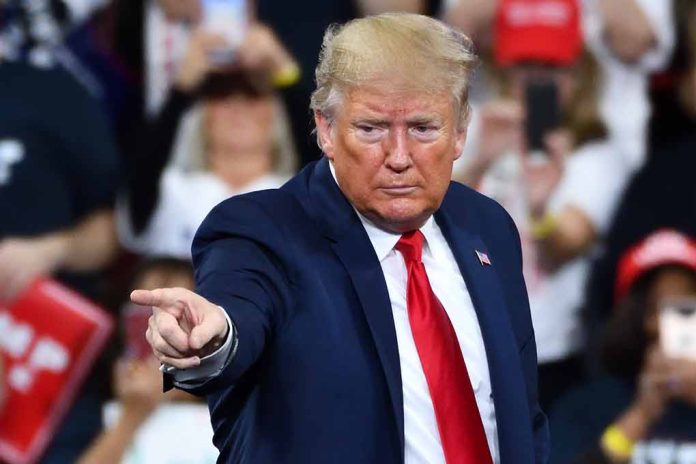
President Trump ignites a constitutional showdown by invoking the “state secrets” doctrine to shield details of Venezuelan deportation flights, despite a federal judge’s order demanding transparency.
Key Takeaways
- Trump administration used the 18th-century Alien Enemies Act and “state secrets privilege” to deport alleged Venezuelan gang members without court proceedings.
- Chief Judge James Boasberg ruled immigrants must have opportunities to challenge their designation as gang members, but flights continued despite his order.
- Administration officials including AG Pam Bondi, Secretary of State Marco Rubio, and DHS Secretary Kristi Noem cited national security concerns in supporting the secrecy.
- Trump has called for Judge Boasberg’s impeachment, while Supreme Court Chief Justice John Roberts stated impeachment is not appropriate for judicial disagreements.
- The case highlights tensions between executive power, national security interests, and judicial oversight of immigration enforcement.
Constitutional Clash Over Deportation Flights
The Trump administration has sparked intense legal debate by invoking the “state secrets” doctrine to withhold information about deportation flights carrying over 200 Venezuelan migrants to El Salvador. This rare legal maneuver comes as part of an escalating confrontation with Chief Judge James Boasberg, who ordered a halt to the deportations and demanded details about flights that had already departed. The administration’s legal team, led by Deputy Assistant Attorney General Drew Ensign, maintains that revealing information about these operations would compromise diplomatic relationships and threaten national security interests.
At the center of this dispute is the administration’s unprecedented application of the Alien Enemies Act, a law from 1798 that hasn’t been used since World War II. The law allows for deportation of noncitizens without standard court proceedings during times of declared hostilities. Trump officials argue this authority falls squarely within executive powers, while Judge Boasberg has questioned whether individuals have received due process to challenge their designation as gang members or “hostile actors” before deportation.
“We can’t tell everybody how we do this”: Trump admin invokes state secrets privilege after court orders more details on deportation flights. pic.twitter.com/7BiL9VFjsJ
— FOX & Friends (@foxandfriends) March 25, 2025
Judicial Authority Questioned
The administration has taken the unusual step of asking an appeals court to remove Judge Boasberg from the case entirely, arguing he has overstepped his authority in matters of foreign policy and national security. In court filings, the Justice Department claims that Boasberg’s oral order did not need to be followed immediately, only his written order, and that it would not apply to flights that had already departed U.S. airspace when issued. This technical argument has drawn sharp criticism from the bench, with Boasberg characterizing some government arguments as “intemperate and disrespectful.”
The dispute has also reached the appellate level, where Circuit Court Judge Patricia Millett remarked on the constitutional implications. “The president has to comply with the Constitution and the laws like anyone else,” Millett said during proceedings, drawing comparisons to how even Nazi detainees during World War II were afforded certain legal protections. These comments highlight the fundamental tension between executive authority and judicial oversight during national security operations.
Political Fallout and International Complications
President Trump has responded forcefully to judicial interference, calling for Judge Boasberg’s impeachment and questioning his impartiality on social media. This prompted a rare statement from Supreme Court Chief Justice John Roberts, who defended judicial independence by stating that “impeachment is not an appropriate response to disagreement concerning a judicial decision.” The political dimension of this case has intensified as declarations from Attorney General Pam Bondi, Secretary of State Marco Rubio, and Homeland Security Secretary Kristi Noem have all been filed supporting the invocation of state secrets.
Meanwhile, the Venezuelan government has added another layer of complexity by filing legal action in El Salvador seeking the release of the 238 Venezuelans currently held in a maximum-security prison. Civil liberties advocates have expressed concern about the secrecy surrounding the entire operation. “This has all been done in secret,” noted one attorney involved in the case, highlighting the limited information available about how individuals were identified for deportation or what evidence was used to classify them as gang members. The administration maintains that such operational details must remain classified for security reasons.
Sources:
Trump administration invokes state secrets privilege in case over deportations under wartime law
Trump invokes ‘state secrets’ to hide deportation details from court



